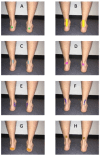Do Anxiety, Depression, Fear of Movement and Fear of Achilles Rupture Correlate with Achilles Tendinopathy Pain, Symptoms or Physical Function?
- PMID: 39860478
- PMCID: PMC11766004
- DOI: 10.3390/jcm14020473
Do Anxiety, Depression, Fear of Movement and Fear of Achilles Rupture Correlate with Achilles Tendinopathy Pain, Symptoms or Physical Function?
Abstract
Objectives: To determine if psychological factors, such as anxiety, depression, fear of movement and fear of rupture are associated with increased tendon-related disability, quantified by the Tendinopathy Severity Assessment-Achilles (TENDINS-A). Design: Cross-sectional. Setting: Online Qualtrics survey. Participants: Sixty-eight participants (54% female) with Achilles tendinopathy and a mean (standard deviation) age of 40.1 (12.6) years. Main Outcome Measures: The TENDINS-A (including subscales of pain; symptoms such as stiffness; physical function), Patient Health Questionnaire-9, General Anxiety Disorder-7, Tampa Scale for Kinesiophobia and fear of tendon rupture. Associations were evaluated using generalised linear models (adjusting for age and sex), with significance accepted when p < 0.05. Results: Anxiety symptoms were positively associated with Achilles pain (p = 0.035), symptoms (p = 0.045) and physical function (p = 0.019). Depressive symptoms were negatively associated with symptoms (p = 0.045) but not pain (p = 0.078) or physical function (p = 0.429). Fear of movement was not associated with pain (p = 0.479), symptoms (p = 0.915) or physical function (p = 0.064). Fear of rupture was associated with pain (p = 0.042), but not symptoms (p = 0.797) or physical function (p = 0.509). Conclusions: Our research demonstrated anxiety symptoms and fear of rupture, not fear of movement or depressive symptoms, are positively associated with the severity of tendon-related disability. Therefore, clinicians should include an assessment anxiety symptoms and fear of rupture in their practice.
Keywords: Achilles; TENDINS-A; psychological factors; tendinopathy; tendon.
Conflict of interest statement
The authors declare no conflicts of interest.
Figures
Similar articles
-
Psychological factors show limited association with the severity of Achilles tendinopathy.Phys Ther Sport. 2024 May;67:118-124. doi: 10.1016/j.ptsp.2024.04.004. Epub 2024 Apr 18. Phys Ther Sport. 2024. PMID: 38685174
-
TENDINopathy Severity Assessment - Achilles (TENDINS-A): Development and Content Validity Assessment of a New Patient-Reported Outcome Measure for Achilles Tendinopathy.J Orthop Sports Phys Ther. 2024 Jan;54(1):70-85. doi: 10.2519/jospt.2023.11964. J Orthop Sports Phys Ther. 2024. PMID: 37615161
-
Are we asking the right questions to people with Achilles tendinopathy? The best questions to distinguish mild versus severe disability to improve your clinical management.Phys Ther Sport. 2024 May;67:54-60. doi: 10.1016/j.ptsp.2024.03.005. Epub 2024 Apr 5. Phys Ther Sport. 2024. PMID: 38593625
-
Achilles tendinopathy.Man Ther. 2002 Aug;7(3):121-30. doi: 10.1054/math.2002.0458. Man Ther. 2002. PMID: 12372309 Review.
-
The clinical diagnosis of Achilles tendinopathy: a scoping review.PeerJ. 2021 Sep 28;9:e12166. doi: 10.7717/peerj.12166. eCollection 2021. PeerJ. 2021. PMID: 34692248 Free PMC article.
References
-
- Sleeswijk Visser T.S.O., O’Neill S., Colaris J.W., Eygendaal D., Vos R.J. Normative ultrasound values for Achilles tendon thickness in the general population and patients with Achilles tendinopathy: A large international cross-sectional study. Scand. J. Med. Sci. Sports. 2024;34:e14665. doi: 10.1111/sms.14665. - DOI - PubMed
LinkOut - more resources
Full Text Sources


